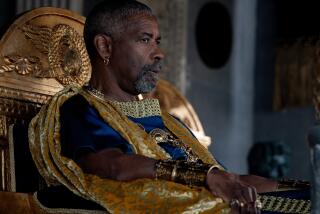Warner Bros. shuffles its DC film executive ranks after ‘Batman v Superman’ criticism
- Share via
After enduring weeks of criticism for the Zack Snyder-directed superhero film “Batman v Superman: Dawn of Justice,” Warner Bros. is shuffling the executive ranks in charge of its key DC comic book-based film business.
The Burbank-based film company is giving two of its executives increased oversight of the key superhero movie franchise, which is seen as an important pillar of the Time Warner Inc.-owned studio’s movie strategy.
Warner Bros. has named Executive Vice President of Development and Production Jon Berg and DC Comics Chief Creative Officer Geoff Johns to lead DC Films, a recently designated brand for company’s movie business, according to a person familiar with the matter who was not authorized to speak publicly.
Berg and Johns had already been considered part of an unofficial “brain trust” for the DC Comics franchise that was also said to include Snyder; his producer-wife, Deborah; and Charles Roven, producer of director Christopher Nolan’s “Dark Knight” trilogy.
But the reorganization, first reported Tuesday night, officially designates the two executives with leadership roles tied to the upcoming Warner Bros. superhero films, giving them more say over the creative direction and production of the DC films.
Johns is a respected comic book writer-turned executive, who was a key player in the success of DC television properties such as showrunner Greg Berlanti’s “The Flash” and “Arrow.” Johns is also co-writing the next standalone “Batman” movie with Ben Affleck. Berg, also a film producer, is known for his role in guiding movies such as “The Dark Knight Rises,” “Argo” and “American Sniper” to the big screen.
The executive appointments appear to be aimed at addressing concerns among comic book movie fans and critics over the future of the DC cinematic universe. Much is riding on the success of the DC films for Warner Bros., which has at least 11 of the superhero movies planned through the next few years.
The critical reception for “Batman v Superman” was decidedly negative, with reviewers and fans highlighting its dark and gloomy tone and questioning Snyder’s handling of the two most widely known superheros. Batman v Superman” grossed $870 million at the worldwide box-office since its March debut. Yet Marvel Studio’s competing film “Captain America: Civil War” is expected to hit the $1-billion box office mark this week, less than a month after its debut in theaters.
And while “Batman v Superman” was not a commercial failure by any means, analysts have described it as a mildly disappointing start for the franchise. The $250-million film was intended to set up a series of pictures including “Wonder Woman,” “Aquaman” and the two-part “Justice League.”
“It wasn’t what they needed it to be,” said Doug Creutz, a media analyst with Cowen & Co. “I think they felt they needed to do something to get better results.” Warner Bros. declined to comment.
The management shuffle is the the latest sign that Warner Bros. is tweaking its approach to the franchise as it tries to ramp up competition with Walt Disney Co.’s Marvel Studios. For example, Ben Affleck, who played Batman in the new film and directed the Oscar-winning film “Argo,” was recently revealed as an executive producer for “Justice League.”
Screenwriter Seth Grahame-Smith, who was set to make his directorial debut with “The Flash,” slated for 2018, left the film in April over creative differences with the studio. Warner Bros.’s next DC film, “Suicide Squad,” centering on a group of villains, recently underwent additional shooting ahead of its summer release date.
It’s unclear how much impact the DC Films executive changes will have on the way decisions are made at the company. Berg will continue to report to Warner Bros. production President Greg Silverman, while Johns will continue to report to DC Entertainment head Diane Nelson.
“It seems really logical,” said Jason E. Squire, a film business professor at the University of Southern California. “They are adjusting their internal reporting structure for it to be more efficient and — in the case of DC Films — branded.”
Some industry insiders have suggested that the divergent results between the steady run of hits from Disney-Marvel and Warner Bros.’ rocky start with its DC cinematic universe can be traced to the different ways in which creative decisions are made at the two companies.
Marvel’s movies are all personally overseen from start to finish by Marvel Studios President Kevin Feige, while Warner Bros. has no such single figure creatively overseeing its DC films.
While some have interpreted the DC executive shifts as an effort to more closely emulate the Marvel decision-making model, Warner Bros. has always maintained its commitment to a director-driven approach that resulted in Christopher Nolan’s blockbuster “Dark Knight” trilogy.
“They adopt a filmmaker-friendly approach, which I think is a very smart strategy and has proven successful,” Affleck told The Times in March.
Former Fox executive Hutch Parker, who produced Fox’s upcoming superhero film “X-Men: Apocalypse,” sees value in both that kind of filmmaker-driven approach and what is widely seen as Marvel’s producer-driven one.
“I think there are pros and cons to both,” Parker said recently. “I think what Marvel has done is remarkable and there’s a tremendous amount to be learned from what Kevin has done there. And I think there’s something to be said for the inclusion that you see reflected at Warners or Fox.... I don’t think it’s an either-or in any way.”
Times staff writer Josh Rottenberg contributed to this report.
Follow Ryan Faughnder on Twitter for more entertainment business coverage: @rfaughnder
UPDATES:
May 18, 2:33 p.m.: This post was updated throughout.
The first version of this article was published May 17 at 10:02 p.m.
More to Read
From the Oscars to the Emmys.
Get the Envelope newsletter for exclusive awards season coverage, behind-the-scenes stories from the Envelope podcast and columnist Glenn Whipp’s must-read analysis.
You may occasionally receive promotional content from the Los Angeles Times.










